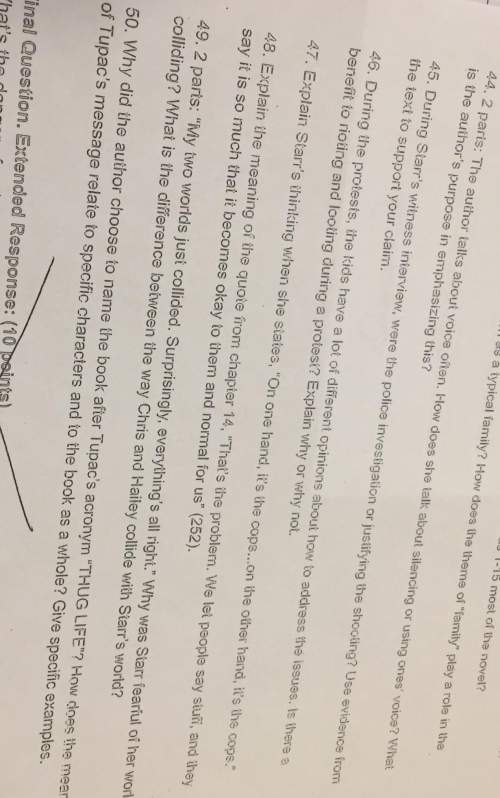
English, 23.04.2020 22:55 crookdamian21
Why does the narrator of “Ambush” most likely lie to his daughter when she asks if he has ever killed anyone?
A. He does not understand why she is asking him.
B. He does not ever want to talk to her about the war.
C. He thinks that she is too young to know the answer.
D. He thinks that she will judge him harshly for what he did.

Answers: 3


Another question on English

English, 21.06.2019 20:10
Iam for the "immediate, unconditional, and universal" enfranchisement of the black man, in ev [loud applause.] without this, his liberty is a mockery; without this, you might as well almost slavery for his condition; for in fact, if he is not the slave of the individual master, he is the slay liberty as a privilege, not as a right. he is at the mercy of the mob, and has no means of protec how does the repetition of the phrase "without this" support the paragraph's argument? it reinforces the idea that without equality in the us, the idea of a free society is a joke. it suggests that a free society is possible, with or without equal rights for all people. it indicates that douglass would be content without material possessions or status. it proposes that slavery will not be abolished in the us without the support of all citizens.
Answers: 3

English, 22.06.2019 00:30
Ajourney with my father adapted from my reminiscences by sir rabindranath tagore probably in order to teach me to be careful, my father placed a little small change in my charge and required me to keep an account of it. he also entrusted me with the duty of winding his valuable gold watch for him. he overlooked the risk of damage in his desire to train me to a sense of responsibility. when we went out together for our morning walk, he would ask me to give alms to any beggars we came across. but i never could render him a proper account at the end of it. one day, my balance was larger than the account warranted. "i really must make you my cashier," observed my father. "money seems to have a way of growing in your hands! " that watch of his i wound up with such indefatigable1 zeal that it had very soon to be sent to the watchmaker's in calcutta. i am reminded of the time when, later in life, i was appointed to manage the estate and had to lay before my father, owing to his failing eyesight, a statement of accounts on the second or third of every month. i had first to read out the totals under each head, and if he had any doubts on any point, he would ask for the details. if i made any attempt to slur over or keep out of sight any item which i feared he would not like, it was sure to come out. so, these first few days of the month were very anxious ones for me. as i have said, my father had the habit of keeping everything clearly before his mind—whether figures of accounts, or ceremonial arrangements, or additions or alterations to property. he had never seen the new assembly hall built at bolpur, and yet, he was familiar with every detail of it from questioning those who came to see him after a visit to bolpur. he had an extraordinary memory, and when once he got hold of a fact, it never escaped him. my father asked me to copy the favourite verses, with their translation, from the book he liked reading every day. at home, i had been a boy of no account. here, when these important functions were entrusted to me, i felt the glory of the situation. 1. tireless 7 how does the narrator support the idea that his father keeps everything clearly before his mind? a. by giving the example of his father's response when his account did not tally with the money that he had in hand b. by mentioning that his father was interested in everything that happened around him c. by giving the example of his father knowing every detail of the new assembly hall at bolpur d. by mentioning that his father had marked his favorite verses from his favorite book
Answers: 3

English, 22.06.2019 02:30
Which statements describe the last two lines of a shakespearean sonnet? select three options.
Answers: 1

English, 22.06.2019 07:00
Read the paragraph. theodore roosevelt was the greatest president because as a leader of the progressive party, he brought about much-needed social, political, and economic reform. one of his economic reforms was to break up many large business trusts. by doing so, he took economic power out of the hands of the wealthy and powerful corporations and placed it in the hands of the ordinary people. theodore roosevelt’s reform policies, known as the square deal, to give the average citizen an equal share of opportunities. which sentence is the thesis of this paragraph? theodore roosevelt was the greatest president because as a leader of the progressive party, he brought about much-needed social, political, and economic reforms. one of his economic reforms was to break up many large business trusts. by doing so, he took economic power out of the hands of the people and placed it in the hands of the ordinary people. theodore roosevelt’s reform policies, known as the square deal, to give the average citizen an equal share of opportunities.
Answers: 2
You know the right answer?
Why does the narrator of “Ambush” most likely lie to his daughter when she asks if he has ever kille...
Questions



Mathematics, 06.10.2019 13:30

Chemistry, 06.10.2019 13:30


History, 06.10.2019 13:30

Biology, 06.10.2019 13:30



Geography, 06.10.2019 13:30

Biology, 06.10.2019 13:30


History, 06.10.2019 13:30


History, 06.10.2019 13:30





Mathematics, 06.10.2019 13:30




